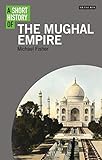A short history of the Mughal Empire / Michael H. Fisher.
Material type: TextSeries: I.B. Tauris short historiesPublisher: London ; New York : I.B. Tauris & Co Ltd, 2016Copyright date: ©2016Description: xiii, 274 pages : illustrations, maps ; 22 cmContent type:
TextSeries: I.B. Tauris short historiesPublisher: London ; New York : I.B. Tauris & Co Ltd, 2016Copyright date: ©2016Description: xiii, 274 pages : illustrations, maps ; 22 cmContent type: - text
- still image
- unmediated
- volume
- 9781848858732
- 1848858736
- 9781848858725
- 1848858728
- Mughal Empire
- 954.025 23
- DS461 .F57 2016
| Item type | Current library | Collection | Call number | Status | Barcode | |
|---|---|---|---|---|---|---|
 Books
Books
|
PIPS Library | NFIC | 954.025 FIS-M 378 (Browse shelf(Opens below)) | Available | 378 |
Includes bibliographical references (pages 251-262) and index.
The Central Asia and Indian origins of the Mughal Empire, 1526-40, 1555-6. Babur until his conquest of North India in 1526 -- Indians and Emperor Babur create the Mughal Empire, 1526-30 -- Emperor Humayun and Indians, 1530-40, 1555-6 -- Establishment of the Mughal Empire under Emperor Akbar, 1556-1605. Emperor Akbar makes himself the center of the Mughal Empire -- Emperor Akbar and his core courtiers build the Mughal administration and army -- Emperor Akbar's courts, ideologies and wars, by main capital -- The Mughal Empire established, 1605-1707. Emperor Jahangir and the efflorescence of the Imperial Court, 1605-27 -- Emperor Shah Jahan and building up the Mughal Empire, 1628-58/66 -- Expanding the frontiers and facing challenges under Emperor 'Alamgir, 1658-1707 -- The fragmentation and memory of the Mughal Empire, 1707-the present. The thinning of the empire, 1707-1857 -- Contested meanings of the Mughal Empire into the twenty-first century.
"The Mughal Empire dominated India politically, culturally, socially, economically and environmentally, from its foundation by Babur, a Central Asian adventurer, in 1526 to the final trial and exile of the last emperor Bahadur Shah Zafar at the hands of the British in 1858. Throughout the empire's three centuries of rise, preeminence and decline, it remained a dynamic and complex entity within and against which diverse peoples and interests conflicted. The empire's significance continues to be controversial among scholars and politicians with fresh and exciting new insights, theories and interpretations being put forward in recent years. This book engages students and general readers with a clear, lively and informed narrative of the core political events, the struggles and interactions of key individuals, groups and cultures, and of the contending historiographical arguments surrounding the Mughal Empire."--Back cover.
There are no comments on this title.
